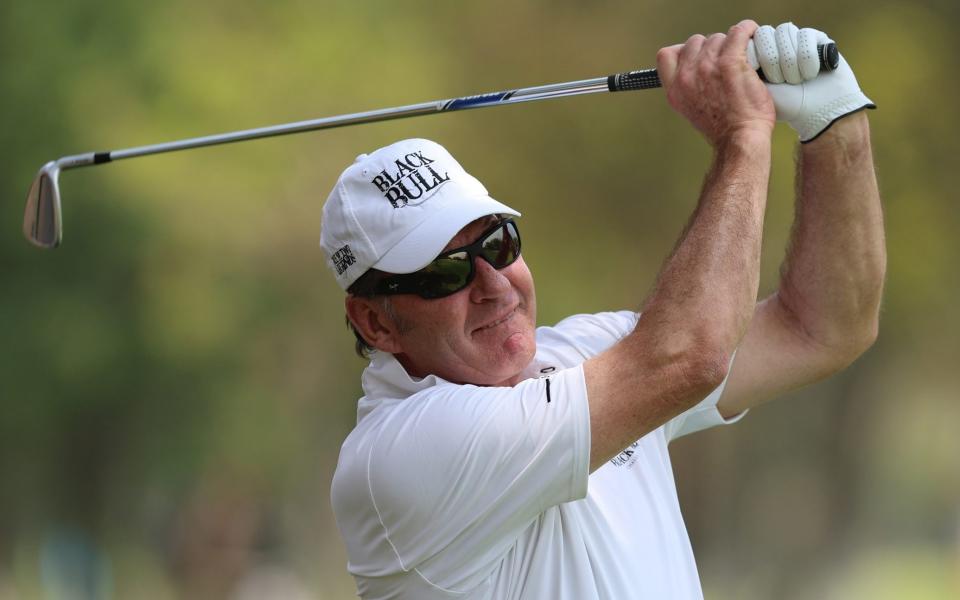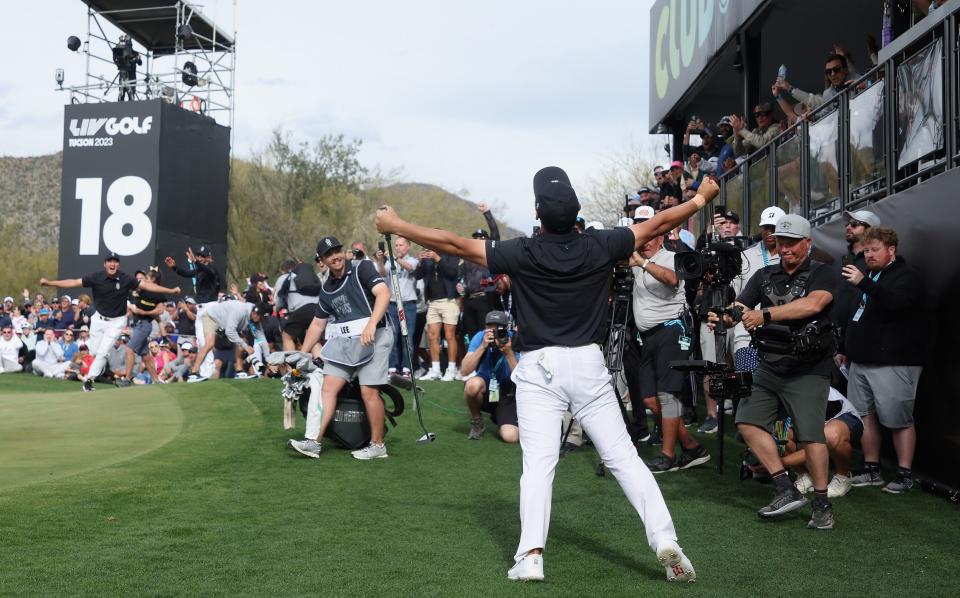Sir Nick Faldo: LIV players have quit their job – and now they want a bonus

Sir Nick Faldo is back. And he is as full as ever of opinions, on everything from the BBC, through the height of tees, to LIV Golf. His return, however, may come as a surprise, because last August he bade farewell from the commentary box at the American network CBS, for whom he had covered all the big golfing events (and a few smaller ones) for 16 years.
As goodbyes go, this was one that looked pretty permanent, an adieu so tearful that he and his fellow pundits ran out of tissues. Yet, barely seven months on, the 65-year-old has returned to be part of Sky’s coverage of the Masters from Augusta. And one thing is for sure: his time away from the microphone has not dampened his opinions.
Take his view of LIV Golf, the Saudi-backed breakaway tour run by his old Masters sparring partner Greg Norman.
“All this ‘we’re going to supercharge the excitement’,” he says of LIV’s claim it is a golfing game-changer. “Well, we haven't seen any excitement because nobody's watching.”
As for the LIV players breaking off to do their own thing and then insisting on competing in a tournament such as the Masters, Faldo is not holding back.
“Hey, if you want to go and do something different, fine. But this [playing in the Masters] is a bit like: You had a job in a store and now you've got a new one, then you're calling the store demanding you get a bonus. I've got nothing against these guys, the grass is greener on the other side and all that. But don't get all uppity if people object when you come back.”
Lest anyone accuse him of being the Roy Hodgson of television punditry, unable to keep away even after saying he was off, the great three-time Masters winner wants to make it clear he never said he was retiring. Just pulling back.
“I wanted to cut down from full-time commentary. It was too much,” he says. “It's a great job, don’t get me wrong. But you're basically flying twice a week. You check out of a hotel and they say: See you again next year. And sure enough, another year goes by and you're checking in again. And hey, that just hit me and I was like: I’m off. I have other things to do with my life.”
There is, he says, plenty to do: he has a course design business and is involved in a tournament in the Far East trying to fast-track new players on to the DP World Tour – which he calls the “hashtag growing the game.”
Then there is his farm in the middle of Montana, from where he is speaking to Telegraph Sport. Though he is quick to point out "farm" may be something of an exaggeration: He is definitely no golfing Jeremy Clarkson.
“He's doing it properly and as he goes he’s highlighting the bloody difficulty of being a farmer in Britain. So good on him,” he says of Clarkson. “I’m just about getting my boots muddy. Most of my time seems to be spent feeding the dogs. Really, we're just doing it all for the scenery.”
Have a beautiful day! 🎣⛰#Paradise Valley #Montana @FaldoFarmMTUSA pic.twitter.com/RkgNQiybmW
— Sir Nick Faldo (@NickFaldo006) October 21, 2022
And he describes the view from the window as he speaks, the uninterrupted mountain range, the river where he fishes, the several feet of snow that has lain thereabouts all winter.
“Yeah, that’s been a surprise,” he says of the four months of deep-freeze conditions. “Augusta will make a nice change.”
Though it is not just the lush fairways and magnolias that are drawing him back down to Georgia. It is the golf. The lure of being involved once again in a sport which he has played and commentated on for the past 46 years.
“I want to do the big stuff,” he says. “I want to be there for the Majors.”
In the United States, he became a much-loved fixture of the CBS golf coverage, his light touch, dry humour and refusal to take himself seriously were hugely admired. Which might come as a surprise to Sky viewers in Britain who remember him as a golfer of almost terrifying intensity. Where did that comedy come from? After all, he was not joking when he hunted down Greg Norman on that final day in Augusta in 1996 to win his third green jacket.
“I felt insulted when people said I invented my broadcasting style to disguise the fact I was such an arse,” he says. “I read people saying it was an act to come across as a nice guy. Actually, it is me. I credit my dad for this. He loved his amateur dramatics, and I think it brings out the theatre in me. Make it quick, make it funny. And it's a show, that's the other thing to remember: It’s entertainment. I always thought, ‘Well if I entertain myself, then hopefully that comes across.’”
When he talks about what is needed at Augusta, he knows precisely what he is talking about. “Way back from my first year of TV, I said, 'All right, don't sit here and wish you were out there. Just say what you see and let the pictures tell the story'.”
'Golf is a global sport and Augusta is its showcase. The BBC should be there'
Not that Faldo is lacking in opinion. There is, for instance, his take on the fact that, barring a late stay of execution, the BBC will no longer broadcast so much as edited television highlights from Augusta. After all, it was watching the Beeb’s coverage of Jack Nicklaus winning the 1972 edition on his parents’ new colour television that first lured the teenage Faldo into the game.
“Well, it's not right,” he says of BBC Television’s probable absence. “It’s a global sport and Augusta is its showcase. They should be there. Very simple, they really should be there.”
Then there is his dismay at the manner in which equipment advances have changed the nature of the game, particularly the distance of drives. “I come from an era when only about five golfers could hit over 300 yards. Now everyone can. We had drivers that had a sweetspot the size of a pea. Now they are the size of Montana.”
His solution is a simple one, a lot simpler than the PGA's mooted idea of altering the ball, which is causing such unrest in the locker room. “I mean it sounds a silly thing, but it’s the size of the tee peg,” he says. “They wallop these drives from tees about a foot high. Make them play off the ground and instantly they won’t be able to hit the ball into the next time zone.”
And then there is LIV Golf. Initially he said he did not want to talk about LIV. But once he starts, there is no stopping him.
“I'm not against them. They decided the grass is greener on their tour. Fine. The gripes I get is when he [Norman] said these things about doing it to grow the game of golf. We've all been here 40 years or more, hang on mate. The fact is they got a ridiculous cash offer, which for some of them was the right thing to do.
“But as we said, it's gone very quiet. So good luck with changing the game.”

Faldo will doubtless let his opinion be known when he attends the Champions Dinner the night before the Masters starts. This is a unique social gathering in which only those who have previously worn the Green Jacket may attend. Norman will not be there as, largely thanks to Faldo, he never won it. But there will still be a significant representation of LIV players.
“That is going to be a great evening,” he says. “Six of them [LIV golfers] are champions. There could be a few fireside stories after that. Apparently we’re using plastic knives and forks this year. Just in case.”

 Yahoo Sport
Yahoo Sport 




































































